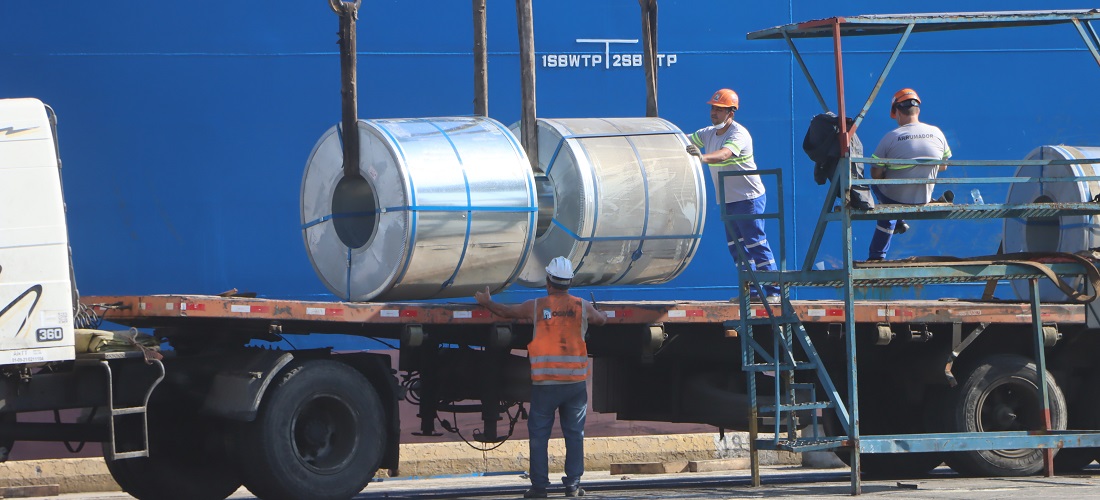
Chinese economic slowdown should benefit steel market in Brazil
Aug, 26, 2022 Posted by Gabriel MalheirosWeek 202234
The Chinese market slowdown is cause for concern in the international arena as the country is the second-largest economic powerhouse in the world. However, Brazil may be one of the few to reap benefits from this, especially regarding steel.
This observation was publically announced at an event held by Inda, Brazil’s Institute of Steel Distributors, as 80% of the steel imported by Brazil comes from China, and a drop in Chinese output could lead to increased participation from the domestic market.
See below the track record of rolled steel exports and import operations in containers carried out by Brazil between January 2019 and Jun 2022. The Mercosur’s customs codes included in the chart below are: HS 7208, HS 7209. HS 7210, HS 7211. HS 7212, HS 7225, HS 7226. The data is from DataLiner.
Rolled Steel | Exports vs. Imports | Jan 2019 – Jun 2022| TEU
Source: DataLiner (click here to request a demo)
According to a report by Itaú BBA on the subject, Inda remains assertive that steel sales will grow by 3% year on year due to stable demand from the machinery and energy industries.
“Chinese production is not only in a slowdown, but it is also limited by drought and heat waves in the country,” the report stresses.
Profit Margins and Volume
During the event, Miguel Holmes, commercial vice president at Usiminas, highlighted that Latin American importers produce lower volumes and benefit from lower margins than Chinese steel producers, making them the first to be affected. “As a result of more limited competition, domestic producers could increase their market share,” he says.
According to Carlos Loureiro, president of Inda, sales growth will be driven by several factors, including the resilience of shipments to the automotive, energy, and machinery areas of the economy, which will offset weaker sales in the white goods segment, as well as increased participation of Brazilian distributors, which will be “favored by the current climate of weak demand and lower margins, which encourage smaller orders that these companies can handle with more flexibility.”
Inventories
Regarding steel inventories, Inda projects that they will sustain themselves for around 2.6 months this year. Loureiro emphasized that there should be no changes in this regard, adding that “the unlikelihood of global raw material prices going up will likely prevent buyers from raising stock levels.”
Hard times
Companies listed on the Stock Exchange, which showed a mixed performance during the second quarter thanks to increased costs and higher freight prices, in addition to the Chinese slowdown itself, were taken by a wave of cautiousness.
China recently upped its economic stimulus package, adding another 1 trillion yuan – or $145 billion – to spur growth and contain the impacts of lockdowns and the housing crisis.
Prospects in Brazil
The vice president of Usiminas highlighted that structural deficits in the vehicle sector and the heating up of civil construction can support the growth of the flat steel sector in the future.
Factors such as the increase in the share of the number of inhabitants per car, higher than that of mature economies, reduction of the housing deficit, which could heat civil construction, greater mechanization of agribusiness, and the new regulatory framework for water and sanitation in Brazil can boost steel demand.
Imports down
The flat steel market has been noticing fewer and fewer imports. According to Inda, the sector’s imports dropped 4.2% in July compared to June and fell by 47.8% compared to the same month of the previous year, accounting for 110.2 thousand tonnes.
As for steel sales made by distributors in Brazil, the figures point to a 315.3 thousand tonnes volume, up 4.1% compared to June and 20.6% YoY, according to Inda.
According to the institution, forecasts point to a boost in the upward trend for steel, with the estimated consumption of the product per inhabitant increasing twofold in the next ten years thanks to investments in infrastructure.
Source: Mais Retorno
To read the full original article, please go to: https://maisretorno.com/portal/desaceleracao-china-beneficiar-aco-brasil
-
Shipping
Feb, 08, 2021
0
Brazil will not renew bilateral maritime transport agreement with Argentina
-
Grains
Jun, 02, 2021
0
Agricultural sector GDP rises 5.7% in the first quarter
-
Ports and Terminals
Dec, 18, 2020
0
Public hearing approved for the privatization of Codesa
-
Dec, 01, 2021
0
Ministry of Economy simplifies procedures for importing used production lines



